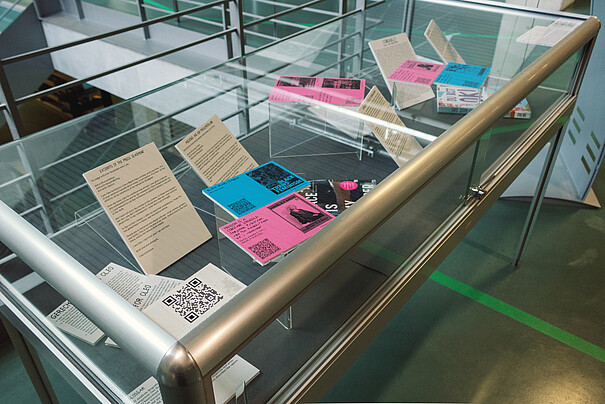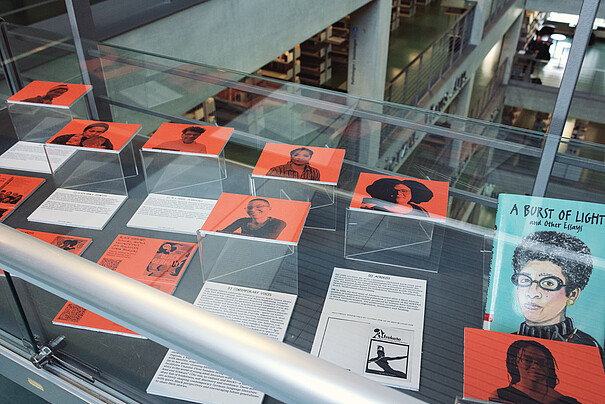
TransLivesMatter: Cleo and Consuelo
The stories of Cleo and Consuelo
Queer-feminist struggles for equality have been and continue to be inextricably linked to the emancipatory movements of sex workers: both movements insist on their right to control their own bodies independently of the state and the police and fight for self-determination. Historically, queer people have often been involved in sex work. They were therefore involved in the struggle for the rights of both groups. In addition, queer sex workers are exposed to targeted queerphobia because of their work. In addition to experiencing stigmatisation towards sex work, they experience discrimination in society, in the health system, in government agencies, in the justice system and in the police force.
“Indeed, the fight for LGBTQ rights was and is inseparable from the fight for sex workers’ rights. Both movements insist that the police have no right to tell consenting adults how to use their bodies; both movements demand that the state keep out of marginalized folks’ bedrooms. [...] In addition, due in large part to the limited economic options available to out queer people at the time, many of the participants at Stonewall and in the uprisings that made Stonewall possible themselves sold sex. Those fighting for the liberation of queer people today, and marking the 50th anniversary of Stonewall this June, should know the radical origins of the LGBTQ movement and the debt they owe to sex workers.” (Stern, 2019)
“Queerphobia is an everyday problem, especially for people working in the sex industry. In their work, they are sometimes deliberately exposed to LGBTIQ*-hostile violence and often experience exclusion within the working structures of the sex industry. Hostility towards sex work, stigmatisation and discrimination by society, the health system, authorities, police and the judiciary are part of everyday life.[1] We must counteract this.”
Schwulenberatung Berlin promotes acceptance of different lifestyles and offers professional help for self-help. In addition to gay and bisexual men, numerous projects also address other target groups such as queer refugees, older queer people, trans* and intersex people. A good example is Queer Leben, a counselling programme run by Schwulenberatung that focuses on trans* and intersex issues.
TransInterQueer has been offering a wide range of self-organised services since 2006. These include group activities, educational and outreach work, counselling and information, as well as political work and national and international networking on trans*, inter* and non-binary issues. TrIQ, the provider of TransInterQueer, a social centre for self-organisation, was the first official association of trans* and inter* activists of its kind in Berlin.
LesMigras als Teil der Lesbenberatung
“LesMigraS was founded in 1999 and has developed from a project for lesbian migrants and Black lesbians into a diverse anti-discrimination and anti-violence section within the lesbian counselling service. Today, LesMigraS is a place for trans* and cis women, trans* men, non-binary, inter* and genderqueer people of all sexual orientations and backgrounds. Our work is based on respect for diverse identities and self-definitions—anyone who feels addressed by this is warmly welcome.”
“GLADT is a self-organised group of Black, indigenous and people of colour lesbians, gays, bisexuals, trans, inter and queer people in Berlin who are committed to fighting racism, sexism, transphobia, homophobia, ableism and other forms of discrimination. (A particular focus of our work is on the issues of multiple discrimination and intersectionality [...])”
Quarteera e.V. supports Russian-speaking LGBTQ+ people in Germany. Since Russia’s attack on Ukraine, Quarteera e.V. has been supporting queer war refugees, as well as other people seeking protection from Eastern Europe, Central Asia and the Caucasus, especially from Russia and Belarus, who are seeking refuge in Germany.
“QueerBerg Collective Berlin is a BIPOC Collective for queer Refugee and other trans* artists and performers in Berlin. Our organisational structure follows the revolutionary queer practise of the Houses as Trans and Non-binary people have formed them for decades to provide care and solidarity for each other. [...] Since Prens Emrah founded the collective by the end of 2018, QueerBerg has provided a similar support system for refugee artists both on stage as well as in everyday challenges we face as Black and Brown queers and trans* folks from Syria, Palestine, Malaysia, Kurdistan, Turkey, Asian countries and many more.”
BiBerlin e.V. / Fachstelle Bi+
“With our association, we want to combat existing prejudices and discrimination against bi+ people and promote their self-determined and equal participation in all areas of society. We are committed to promoting science, research, education, and awareness of the realities of life for people of bisexual or nonmonosexual orientations.”
BiBerlin e.V. was founded on 12 August 2018 and grew out of the open bi meeting at the Sonntags-Club, which has been running since 2011. This meeting has its origins in a bisexual discussion group that first took place in 1988, also at the Sonntags-Club.
QuARC
“Berlin Queers Against Racism and Colonialism (QuARC) is a Berlin-based umbrella group for queers* committed to anti-racist and anti-colonial politics.”
“Casa Kuà is self-organised by trans* and non binary BIPoCs to make health more accessible to other trans*, inter*, non binary and queer people, and especially for those affected by racism. The aim of Casa Kuà is to bring traditional and conventional medical treatments together.”
“We at LSVD⁺ – Federation Queer Diversity are a civil rights organisation and have been representing the interests and concerns of lesbian, gay, bisexual, trans* and intersex people, as well as queer people (LSBTIQ*), since 1990. The LSVD⁺ is the largest non-governmental organisation for LGBTIQ* people in Germany. We want LGBTIQ* people to be accepted and recognised as a part of society.”
The LSVD offers various services in the Berlin-Brandenburg area, including MILES, which provides psychosocial support for LGBQTI* refugees, LGBTQI* people with a migration background, and Black and other LGBTQI* people of colour. In addition, the Regenbogenfamilienzentrum offers counselling services, play afternoons and many other services for LGBTQI* people with children or who are planning to have children.
“Sonntags-Club e.V. is an event, information and advice centre for lesbian, gay, bisexual, trans*, inter* and non-binary people. It is a meeting place for all queer people as well as for all friends and interested parties.”
The cultural and educational events are an interesting offering for a broad public throughout the city.
Queerhome*, a housing advice service for queer people, is a project of the Sonntagsclub.
IQZ - Inklusives Queeres Zentrum
The Inclusive Queer Centre (IQZ) is a space for disabled queers and others affected by ableism. As a specialist centre for LGBTIQ+ and inclusion, the IQZ helps to identify and break down barriers.
For a long time, especially until homosexuality was legalised in 1994, queerness was primarily documented by state authorities and doctors for the purpose of criminalisation or pathologisation. Self-determined archives are important spaces for remembrance, resistance and collective self-empowerment.
Black resistance has existed since the beginning of colonisation, but it is underdocumented, not yet widespread, or has little reach. SichtBar aims to fill these gaps. It is a laboratory, reading island, library, archive, information point and mobile memorial. The mobile archive, which consists of a shelf, table, stools and display, is deliberately not only a reading island, but also a meeting point for exchange.
Spinnboden Lesbenarchiv & Bibliothek e.V.
“Spinnboden is an ‘archive from the bottom up’, created in and by the lesbian movement of the 1970s to preserve its own herstories, which would otherwise be marginalised by the prevailing politics of memory. We document the change and diversity of lesbian self-perceptions, cultures and politics, while also offering a place for encounters and discourse.”
“The Gay Museum’s archive is one of the classic ‘movement archives’ that emerged from the political countercultures and subcultures of the post-1968 movements. The archive was established in parallel with the founding of the Gay Museum in 1984/85. Due to the proximity of the museum’s founding to the height of the AIDS crisis around 1985, the archive initially saw itself as an archive of the gay movement, i.e. with a focus on male homosexuality. In recent years, however, the scope of the collection has expanded far beyond movement-related topics and exclusively gay subject matter.”
Out of activism and urgency, counselling programmes such as Mann-o-Meter emerged, particularly in response to the AIDS epidemic. These programmes continue to pursue an HIV-focused approach and represent the historical struggles of the queer community in Berlin.
Podcast recommendation: Unsichtbare Heldinnen - die Rolle von Lesben in der Aids-Krise (131) (Podcast is in German spoken language)
Self-organization often intersects with bars and clubs as important spaces for the queer community: for example, Schwuz was a key gathering place during the AIDS epidemic and remains one of the better-known clubs for the community today. Places like Oya or Silverfuture, as well as party series and workshops, continue to provide space for coming together, exchange, and empowerment within the queer community.

The stories of Cleo and Consuelo

A selection of Black literary perspectives
During Pride Month, the UdK Library presents a diverse exhibition exploring LGBTQIA+ history, culture, and literature with a focus on Berlin.